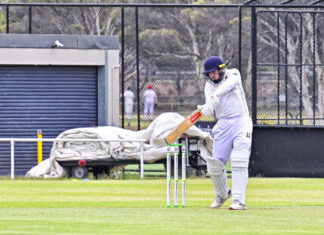By Geelong Story Updates
ROSS Winstanley’s wife is a forgiving woman.
The fish junkie can spend hours on end at sea and not an angry word is uttered between them.
She doesn’t even blink an eyelid.
Anna hooked up with Ross through one of her three fishing brothers after an angling competition.
“She enjoys fishing as long as it doesn’t involve getting up in the dark,” Ross smiles.
“I’d say she’s a fairweather angler – she likes the sun being up and the water being down. But coming from a family that does a lot of fishing, she’s not nervous that I’m out there in the dark or when the wind is blowing hard.”
Fit 60yearold Ross is also the conscience of Corio Bay, volunteering his time in the name of conservation.
He tags up to 500 snapper in a year – not including the whiting of recent months and thousands of crayfish in the past – and records the rod, bait and hooktype used and the length of the species.
“I’m one who knows a lot about a little,” Ross adds.
Tagging the fish with a tiny plastic Tshape device helps identify both movement patterns and growth.
The biggest Ross has tagged was a 42cm King George whiting in April.
Three weeks later it was caught in a net off Avalon.
“I once tagged a snapper in Corio Bay that was caught at Lakes Entrance by a guy I used to know,” Ross chuckles.
Ross, a fisheries biologist, has worked with Department of Primary Industries for 33 years and has been a consultant for the past six.
“I got dragged kicking and screaming into management policy, which I enjoy immensely, but I’m still a frustrated scientist underneath,” he wryly grins.
Fishing, however, is not just a science.
The Highton man runs his own 4.2metre runabout tinnie on Corio Bay most mornings.
The boat is stacked with lots of everyday rods and reels.
Ross particularly likes to cast his ninepound line in shallow water for snapper and sometimes fishes with plastics in search for flathead.
“It’s not scientific at all,” Ross admits.
“I don’t use a lot of hitech gear, although I just bought myself a GPS to get out to my spots in the dark or in the fog.”
But there was a brief period – just once – when Ross survived without fishing.
“I lived in Tassie for five years and the whole time I was there I didn’t own a rod,” he confesses.
“I just regarded inland Tasmania as somewhere you drove to.”
Early memories of his dad hiring a boat to fish gummy sharks and flathead also preceded his first love: spearfishing.
A group of his mates would take off on their bikes first thing Saturday mornings with their gear hanging over the handle bars.
They wouldn’t return home until dark, wringing wet but with a feed of fish.
“We’d light fires at the bottom of the cliffs and stand shivering away in the middle of winter wearing our footy jumpers,” Ross recalls.
But it was spearfishing that later put his life at risk.
“I was towed out to sea by a shark,” he sighs.
“We’d normally suspend all the fish we speared from a float that we towed behind us.
“At the time I had this float attached to my weight belt, which in retrospect wasn’t a very clever idea.
“I had about 30 pounds of fish hanging from this float and all of a sudden I found myself going backward.
“I had to reach around and unclip the rope leading to the float, which was about 50 feet away, and let the shark take off with the fish.”
Fishy tales
Digital Edition
Subscribe
Get an all ACCESS PASS to the News and your Digital Edition with an online subscription
Rosellas in top form
Spurred on by its T20 title win during the week, Lethbridge continued its irresistible form by making a mammoth total against Corio in Geelong...








